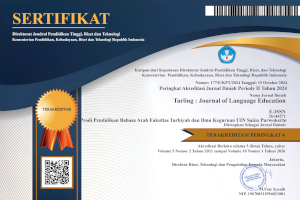Hipotesis Monitor Stephen Krashen dan Reorientasi Pembelajaran Istima-Kalam
DOI:
https://doi.org/10.24090/tarling.v5i2.5897Kata Kunci:
Hipotesis Monitor, Reorientasi Pembelajaran, Pembelajaran Istima-KalamAbstrak
Pada kajian ini penulis menjelaskan tentang hipotesis monitor Stephen Krashen dan Pembelajaran Istima-Kalam. Dengan harapan bisa memberikan solusi terhadap kendala-kendala yang selama ini dialami pengajar dan pembelajar Bahasa Arab terkhusus saat pembelajaran Istima-Kalam. Hipotesis monitor dalam pembelajaran istima-kalam ini harus menyertakan prosedur intruksi dan koreksi dari setiap materi yang dipelajari dan dialami peserta didik. Proses koreksi itu juga perlu mempertimbangkan aspek unsur bahasa Arab terkecil yakni harf. Peserta didik dengan kesulitan mengucapkan harf tertentu, harus diberi intruksi atau arahan dan dipantau (monitor) dengan intens. Intruksi dan koreksi itu diperlukan untuk melihat sejauh mana peserta mampu menguasai pelafalan harf secara benar, menguasai pembentukan kata, dan kalimat menurut tarakib yang sesuai dengan ilmu sharf (morfologi Arab) dan ilmu nahw (sintaksis Arab). Baru kemudian menyusun persambungan dan persesuaian (muthabaqah) antar kalimat untuk menjadi lisan atau tulis yang bermakna dan berterima.Unduhan
Diterbitkan
2022-01-10
Terbitan
Bagian
Articles
Lisensi
Authors who publish with this journal agree to the following terms:
- Authors retain copyright and grant the journal right of first publication with the work simultaneously licensed under a Creative Commons Attribution License that allows others to share the work with an acknowledgement of the work's authorship and initial publication in this journal.
- Authors are able to enter into separate, additional contractual arrangements for the non-exclusive distribution of the journal's published version of the work (e.g., post it to an institutional repository or publish it in a book), with an acknowledgement of its initial publication in this journal.
- Authors are permitted and encouraged to post their work online (e.g., in institutional repositories or on their website) prior to and during the submission process, as it can lead to productive exchanges, as well as earlier and greater citation of published work (See The Effect of Open Access).










